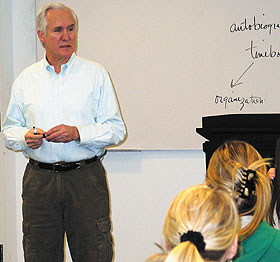  |
| HOME | THIS ISSUE | CALENDAR | GRANTS | BACK ISSUES | < BACK | NEXT > |
Psychology professor discusses memory and conversation by Sherry Fisher - February 19, 2008 | ||||
| Informal, everyday conversations often consist of people trading stories about themselves, says UConn psychology professor Jerome Sehulster. “The content of these “about-self” stories is supplied or supported by our autobiographical memory,” he says, memory of “our personal and experienced past.” Sehulster, who is based at the Stamford Campus, spoke on “Things We Talk About and the Structure of Autobiographical Memory,” on Feb. 7.
His talk was part of a UConn-Stamford Faculty Colloquium Series, now in its second year. The lectures are intended to bring members of the public to the campus, and showcase the faculty. People present themselves to others in virtually everything they do: how they dress, how they speak, the words they use, the company they keep, and the cars they drive, Sehulster said. “And when you think about conversation, apart from talking about the present moment like, ‘My arm hurts,’ any recount of experiences is going to require memory and language,” he said. “Therefore, if we watch how our everyday conversations go, given that these are supported by autobiographical memory, we should be able to infer or gain insights about the structural characteristics of that memory.” Sehulster said that if autobiographical memory supports everyday conversations by supplying the content, “then we could say that perhaps there is a proportional relationship between the amount of cognitive space that we’ve allotted to supporting that content. For example, a person might be able to talk about a topic frequently because he or she has a lot of space for that particular topic.” If that is so, he added, “it follows that individuals would differ in the amount of time they could talk about a topic. One of the questions I ask my students is: ‘How long could you talk about a topic? How long could you talk about the New York Giants? How long could someone talk about Proust’s Remembrance of Things Past?’” According to a study Sehulster conducted, the topics most frequently talked about in adult conversations vary by age, gender, and marital status. In general, younger adults talk more about leisure activities, especially sports, music and partying, shopping, fashion, and romance. Older adults – particularly older married adults, talk more about commuting, work and family, and household-related topics. Sehulster said the amount of time a topic is covered in the news media is roughly proportional to the frequency with which people talk about it in everyday conversation. “How many people watch sport-related shows on cable?” he asked. “How many people watch that as opposed to ballet? People talk more frequently about sports than they do about ballet.” Sehulster said that during conversations where stories are told sequentially, the content of one person’s story becomes a trigger to the next participant’s story, and will usually “match the mood of the conversation.” He said that a person’s autobiographical memory must be organized such that there are “access routes to the memory. If we talk about the memory of our holiday party this past year, and being out on the beach with our bonfire, somebody might say, ‘oh bonfires, I remember the time so-and-so …’ That memory of your bonfire might have been the Boy Scouts, Cub Scouts, or Girl Scouts, in which case the next story is about Girl Scouts, Boy Scouts, or Cub Scouts.” Remembrances of events differ in value, creating a sort of social currency, Sehulster said: “Telling a story about being at the Super Bowl has a lot more currency than having watched the Super Bowl on TV,” he said. “Remembering a Super Bowl that is long past will have more currency – especially if your listeners have only read about it.” |
| ADVANCE HOME UCONN HOME |

